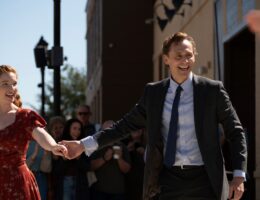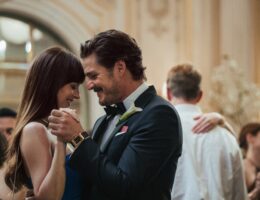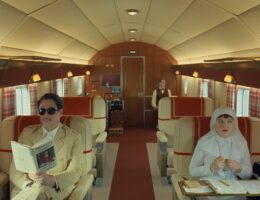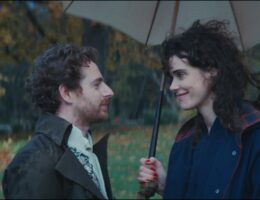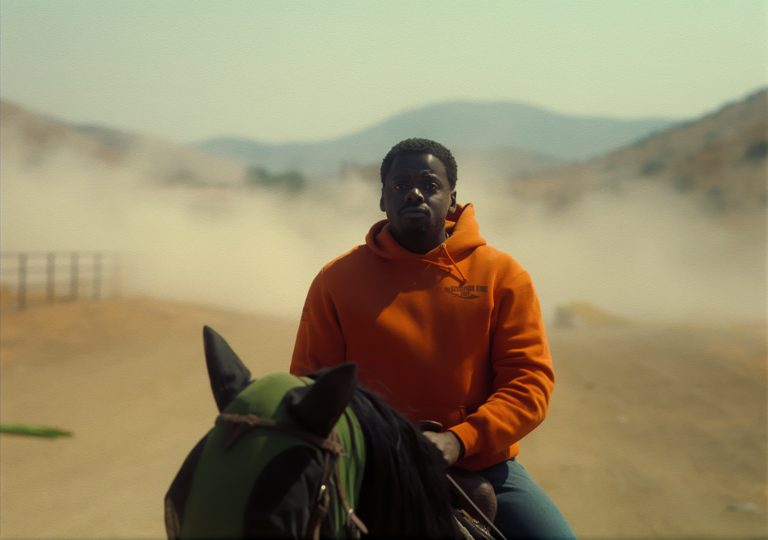Nope (2022 | USA | 131 minutes | Jordan Peele)
After a topsy-turvy couple of years in which big films tiptoed back into cinemas, Nope, the third feature from Jordan Peele – whose debut Get Out got four Oscar nominations and a win for screenplay (the coolest Oscar) instantly announced him as a major auteur in prestige horror – lands in theaters this weekend. In a bombastic blockbuster season of big planes and superhero bloat, Peele’s cryptic tale of weird happenings in a lonely gulch of inland California might just be the best time you can have at a movie theater all summer. Chase and I saw a promo screening this week and couldn’t wait to talk about it.
First, a note of caution. If you care about spoilers and somehow have managed not to have seen the final three-minute trailer, avoid it at all costs! I firmly believe that good art can’t be spoiled, but wow, does that trailer give a lot away. With that said, we’ll try to be somewhat coy about details in our conversation, but again – tread carefully if you want to see the movie knowing nothing about it.
In brief, Nope is about siblings OJ (Daniel Kaluuya) and Emerald (Keke Palmer) Haywood, sibling descendants of a family with deep Hollywood history – their (lightly rewritten) claim to fame involves a jockey great-great-great grandfather who rode the first galloping horse whose motion was captured on film. In the wake of a seemingly freak atmospheric event that took the life of their father, deeply shy and still-grieving OJ has taken over the struggling cinematic horse wrangling business, with occasional much-needed personality assists from his extroverted sister. One night on the remote family ranch, they witness something very strange in the night sky and set out to honor their family legacy by making a high quality recording of it. Their story intertwines with that of a former child star (Steven Yeun), whose low-budget theme park, Jupiter’s Claim, neighbors their property. Thrills, chills, scared horses, violent chimps, and intensely creepy happenings unfold in masterful fashion that never looks anything but spectacular through the lens of ace cinematographer Hoyte van Hoytema (Tenet, Dunkirk, Interstellar).
The embargo for reviews lifted Wednesday morning, and I have to say that I was surprised to see anything other than glowing reactions. What was your reaction?
Chase: I think, and this may be controversial, that Nope is Peele’s best film. While both Get Out and Us are strong works in their own way, this feels like it is really him swinging for the fences in the best way possible. It definitely won’t be everyone’s cup of tea, though I was quite invigorated by it.
Josh: Yeah, by the thrilling final act, I was beaming. I would’ve voted for Get Out a third time if I could’ve. Us had its moments but was kind of a miss for me. Nope is easily his most enjoyable, just an unsettling delight that executes on all levels from unnerving start to bombastic finish. Beyond the Super Bowl spot, I somehow had no idea what the movie about, which is kind of rare for me, so that added another dimension to the experience that I sadly doubt that many will share.
Chase: When I initially was watching the increasing number of trailers, I started to feel like it was giving too much away and that there were too many. However, now upon having seen it, that isn’t the case at all. In fact, there is a specific moment that is a wonderful misdirect that the trailer made seem like it was integral when it very much wasn’t. I won’t say what it is, but it ends up being a gag that also is a fun moment when it happens.
Josh: I watched the long trailer after seeing the preview last night and was flabbergasted by how much it shows. Glad to hear that it still works if you’ve seen it all!
I’ve already sensed murmurings about whether the plot completely hangs together. I disagree. But without getting into all of details, I can’t emphasize enough how little I care about that aspect, particularly one that situates itself in genre and is packed with so many pleasures.
Chase: Getting into a bit deeper on what works for me is just how much Peele is a strong visual storyteller. There were some initial things I was reading about how people were feeling like the story was a bit weak or the characters were a bit underdeveloped. However, I just tend to think that he is growing more comfortable with communicating visually and not spelling everything out.
Josh: I agree completely. If I start thinking about plot mechanics, the director has done something horribly wrong, and the thought never crossed my mind while watching Nope. This is a weird and potentially fraught thing to say about a filmmaker who’s so keenly aware of the glaring flaws of society and its vast structural inequities, but first and foremost Jordan Peele seems like a nice filmmaker. For me, this vibe check is among my most important qualities in whether I enjoy a movie. I always get the sense that he both truly likes (at least some of) his characters and wants his audience to have a good time. No matter how suspenseful or unsettling, I always felt like I was in safe hands with him at the helm.
The filmmaking here is absolutely meticulous, yet never so self-satisfied with its impeccable precision that it forgets that the people watching are there to have a good time. Every shot tells a story, he lets the audience squirm and figure things out for themselves along the way. Little details throughout set up an extremely satisfying conclusion, but these pieces are arranged without being obvious yet are memorable enough that as they start to come together you notice and it feels more like magic than clockwork.
Chase: I still remember one of the more impactful moments in Get Out was when Chris stops the car and, without speaking, goes back to the house to try to rescue others when he could have escaped. It was a subtle callback to the introduction of how he felt guilt for not saving his mom when he was a kid. That is the type of moment that happens a lot in Nope and made me feel like he is growing more confident as a storyteller.
Josh: Indeed, this film is visually stunning throughout, which is why we go to the movies! Yet for the supreme degree of confidence, it’s never ostentatious, from small details to major setpieces. It opens with a terrifying, unexplained sequence (which we later revisit) that finds us on the abandoned set of a 1990s studio sitcom overrun by a chimpanzee in a bright yellow sweater smeared with blood. Later, an older black man sits on a stunning white horse under a sunny blue sky dotted with perfect puffy white clouds, recounting the previous night’s successes just before a freak atmospheric event brutally and swiftly reorients their lives. The next time we’re back there we see that son at night, lit majestically as he checks on a horse in the moonlight, warm light, music, and the warm glow of life spilling from the family house, as he is trying to make sense of it all. The eerie calm is upset by a shadowy dark jellyfish swimming through the dimly lit sky.
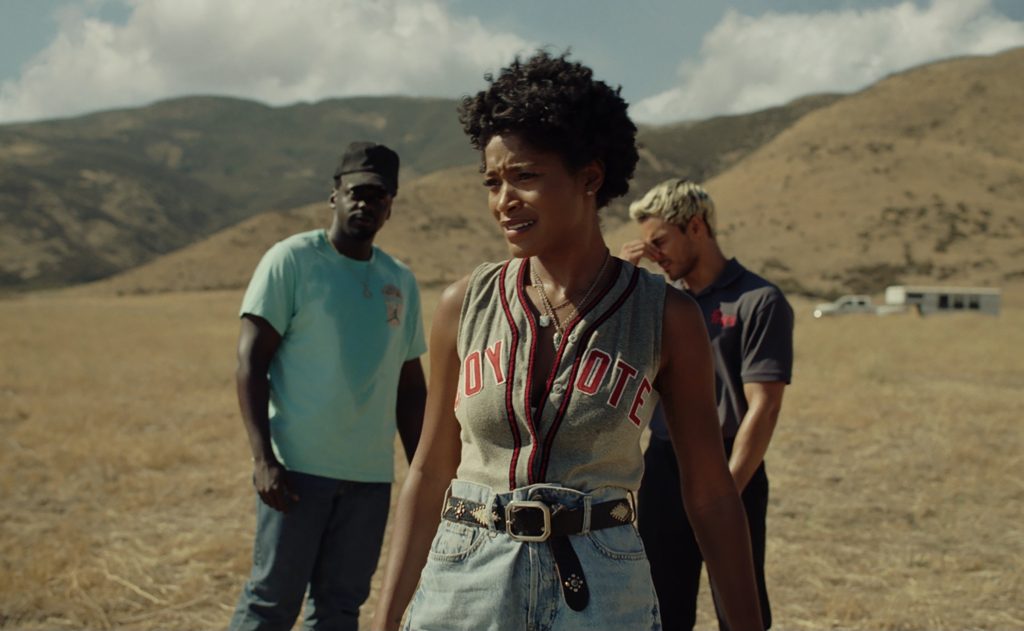
Chase: Daniel Kaluuya as Otis Jr. AKA OJ compliments this perfectly, giving a very understated performance that really shines even in the quiet moments. This is then juxtaposed with Keke Palmer as his more gregarious sister Emerald who really steals every scene she gets. A lot of the reasons why they are the way they are require a bit more listening and quiet observing, as they’re very different people, though I really was quite invested in their journey. My only complaint was there was not enough Keith David, who plays their father Otis Sr., though I understand why that is the case and think it set the story up well.
Josh: So many movies have so little trust in their audience that they arrest their story’s momentum with tedious flashbacks (hello, Thor and the half dozen plot-stopping storytimes) rather than establishing characters. Here, though, Peele recognizes the power of people and trusts his excellent cast to make small gestures, wardrobe choices, and knowing glances go further than pages of exposition. These are vibrant characters with confidence and vulnerability, vivacious dreamers with obligations and history. When you trust your actors, there’s no need for a twee rock monster to smash the breaks for a five minute storytime to convince me that they’re real (But I digress.)
It shouldn’t go unmentioned that as OJ Haywood, Daniel Kaluuya looks goddamn phenomenal on a horse. The movie just doesn’t work without that, let alone his ability to convey a preternatural calm in a crisis that informs his character far more effectively than any monologue. As his sister, Emerald, Keke Palmer is his opposite. Her garrulous extroversion and brightly colored wardrobe (an enviable collection of rock t-shirts) instantly conveys the family history of a girl who filled the space in a household of very quiet men who seem more comfortable with horses (whose pictures adorn the walls) than other people. Brandon Perea (The OA hive, assemble!) gets a nice supporting splash as a thirsty-for-anything-beyond-his-dull-life as a big box electronics store tech team. And gravelly-voiced Michael Wincott also surprises as a one-for-them, one-for-me film director whose expertise intersects with the Haywood siblings’ project and takes it to the next level.
And, at long last, someone finally had the courage to put Steven Yeun in cartoonish Westernwear! And he Makes. It. Work. Playing a child star forever trapped in his celebrity past who’s been left to make a hustle running a minor-league amusement park dedicated to his first role as a kid sheriff, one of his scenes epitomizes the value of people in rooms talking to each other. Asked to tell his side of that grisly incident from the past that opened the film, Steven Yuen’s now-grown-up child star inverts the “show, don’t tell” mantra. It’s a tremendous moment, in which he tells the tale of a traumatic event from his celebrity childhood by dodging the story entirely. Cheerfully pointing out sitcom artifacts and simultaneously deflecting, we watch him still processing the incident by instead recounting a SNL skit. We’ll revisit the incident later, but his non-telling is more vivid than the most gruesome re-enactment.
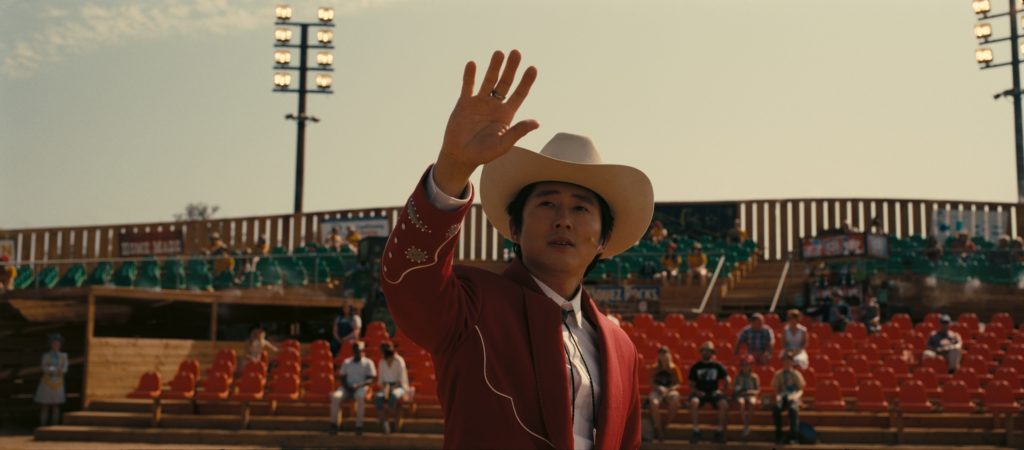
Chase: If there is one complaint I may have it is in regards to the way Yeun’s character often feels like we are only getting glimpses of him. Part of this may be because a movie could always benefit from having more of him in it, though there was still was the sense that a scene or two was cut to keep things moving along. While this is understandable since it is Peele’s longest film already, I still was wondering a bit more about what was going on with him. Alas, the story *ahem* swallows him up and it is quite impactful so that is just a minor concern.
Josh: Yeah, I was willing to forgive the lack of screen time to keep the rest of the pacing so masterful. Peele uses so many audio and visual cues to communicate the sense of growing weirdness around the ranch. He keeps the mystery at a distance for a long time. Quick glimpses and uncertainty abound. Misdirects make us question the nature of this reality. Importantly, his effects are mostly practical (and very effective), grounding us in the mundane while sowing confusion. A praying mantis on a security camera becomes a hilarious nemesis at exactly the wrong time. Often, potential horrors are glimpsed through rain-drenched windows such that dimming lights on the horizon or a lone light approaching the house indicate a looming terror more powerfully than any CGI monster. Goofy rainbow-hued “skydancers” – those inflatable eye-catchers seen most often at used car lots – pepper a sun baked valley and their state of vigor becomes an ingenious way to communicate impending danger. Peele takes the Spielbergian mantra that there’s no effect more powerful than dazzled faces turned up toward this sky in wonder and gives it a horrifying twist. Just so much great stuff to make you remember why movies exist!
The stakes of the story escalate in harmony with the audaciousness of the filmmaking and the degree of visual panache. The effects get bigger along with the scale of the filmmaking techniques, the vibrancy of the camera movement, and the precision of the cuts. The final sequences are kind of absurd, yet also thrilling, hilarious, scary, and touching. Peele conducts these elements with symphonic precision, leading to a welcome release from the pent-up tension.
It also should go without saying that he’s curated a killer soundtrack. Although the moment can’t possibly be as powerful as what Us did for “Got 5 on It”, Peele gives us the robo-trippy remix of Cory Hart’s “Sunglasses at Night” that we didn’t know we needed.

Chase: As for the vibe of the film, it definitely is a crowd-pleaser like you said and Peele does really seem to love the experience of going to the movie. There are plenty of good jokes and gags that will play well to an audience, including one that got a glorious outburst during our screening, though it also just is very well-crafted. Everything is so finely turned to create both tension and humor, a balance that is not easy to strike though Peele makes look easy.
Josh: I really appreciated how even though there’s something strange and scary in the hills, Peele weaves and instead of a story about cowering victims or of hyper-aggressive fighters, Nope is ultimately a movie about people who want to document something that’s never been seen before, leveraging a legacy of excellence and skill, honoring a tradition of craft to make something groundbreaking and spectacular. The goal isn’t killing the thing or saving the world, which is very refreshing.
Chase: I also think the film ends up being his most reflective work yet in what it has to say about the art form itself and that desire to get that one perfect shot. While there is a whole lot of spectacle that surrounds it, that is the story distilled down to its most simple. It works as both a compelling premise and a more meta one, allowing Peele to peel (sorry) back the layers on what he thinks of the industry he has now made a name for himself in. I really quite liked this the more I thought about it and actually thought it was his most confident work in how subtle it was.
Josh: Totally, there are some … metaphors, but plenty room for interpretation. A celebrity-based theme park eager to gobble up the land of a family with forgotten Hollywood history. The power of eye contact versus the danger of seeing and being seen.
Chase: There are probably other interpretations that I’m missing, though I thought the way the opening scene connected with Steven Yeun’s character was really interesting.
Josh: True, this is one of the places where I loved how that sequence played out, the restraint he used in telling it different ways, and the extremely creepy payoff that it epitomizes how it barely occurred to me to think about how or if it actually fit into the main storyline. Still, I’m eager to revisit it to see what I missed!
Chase: I actually thought the ending was fantastic and all the revelations that upend the story were well-realized. In addition to being aware of the history of Hollywood, it was also aware of the way we have seen the UFO in popular imagination. Peele plays with this expectation and then pulls the rug out from under us, making it more dynamic as a result. While this may throw some people for a loop, I was completely on board with the leaps it took as it still was quite thrilling throughout. Hard to picture a better summer movie than this one.
Nope is now playing in theaters
Photos courtesy Universal Pictures
